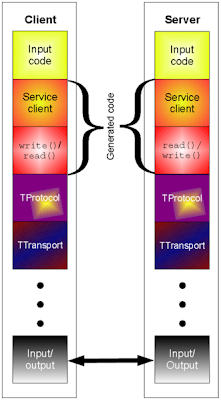Apache Thrift with Java Quickstart
Join the DZone community and get the full member experience.
Join For FreeAccording to the official web site Apache Thrift is a,
software framework, for scalable cross-language services development, combines a software stack with a code generation engine to build services that work efficiently and seamlessly between C++, Java, Python, PHP, Ruby, Erlang, Perl, Haskell, C#, Cocoa, JavaScript, Node.js, Smalltalk, OCaml and Delphi and other languages.
Installing Apache Thrift in Windows
Installation Thrift can be a tiresome process. But for windows the compiler is available as a prebuilt exe. Download thrift.exe and add it into your environment variables.
Writing Thrift definition file (.thrift file)
Writing the Thrift definition file becomes really easy once you get used to it. I found this tutorial quite useful to begin with.
Example definition file (add.thrift)
namespace java com.eviac.blog.samples.thrift.server // defines the namespace
typedef i32 int //typedefs to get convenient names for your types
service AdditionService { // defines the service to add two numbers
int add(1:int n1, 2:int n2), //defines a method
} Compiling Thrift definition file
To compile the .thrift file use the following command.
thrift --gen <language> <Thrift filename>
For my example the command is,
thrift --gen java add.thrift
After performing the command, inside gen-java directory you'll
find the source codes which is useful for building RPC clients and
server. In my example it will create a java code called AdditionService.java
Writing a service handler
Service handler class is required to implement the AdditionService.Iface interface.
Example service handler (AdditionServiceHandler.java)
package com.eviac.blog.samples.thrift.server;
import org.apache.thrift.TException;
public class AdditionServiceHandler implements AdditionService.Iface {
@Override
public int add(int n1, int n2) throws TException {
return n1 + n2;
}
}
Writing a simple server
Following is an example code to initiate a simple thrift server. To
enable the multithreaded server uncomment the commented parts of the
example code.
Example server (MyServer.java)
package com.eviac.blog.samples.thrift.server;
import org.apache.thrift.transport.TServerSocket;
import org.apache.thrift.transport.TServerTransport;
import org.apache.thrift.server.TServer;
import org.apache.thrift.server.TServer.Args;
import org.apache.thrift.server.TSimpleServer;
public class MyServer {
public static void StartsimpleServer(AdditionService.Processor<AdditionServiceHandler> processor) {
try {
TServerTransport serverTransport = new TServerSocket(9090);
TServer server = new TSimpleServer(
new Args(serverTransport).processor(processor));
// Use this for a multithreaded server
// TServer server = new TThreadPoolServer(new
// TThreadPoolServer.Args(serverTransport).processor(processor));
System.out.println("Starting the simple server...");
server.serve();
} catch (Exception e) {
e.printStackTrace();
}
}
public static void main(String[] args) {
StartsimpleServer(new AdditionService.Processor<AdditionServiceHandler>(new AdditionServiceHandler()));
}
}
Writing the client
Following is an example java client code which consumes the service provided by AdditionService.
Example client code (AdditionClient.java)
package com.eviac.blog.samples.thrift.client;
import org.apache.thrift.TException;
import org.apache.thrift.protocol.TBinaryProtocol;
import org.apache.thrift.protocol.TProtocol;
import org.apache.thrift.transport.TSocket;
import org.apache.thrift.transport.TTransport;
import org.apache.thrift.transport.TTransportException;
public class AdditionClient {
public static void main(String[] args) {
try {
TTransport transport;
transport = new TSocket("localhost", 9090);
transport.open();
TProtocol protocol = new TBinaryProtocol(transport);
AdditionService.Client client = new AdditionService.Client(protocol);
System.out.println(client.add(100, 200));
transport.close();
} catch (TTransportException e) {
e.printStackTrace();
} catch (TException x) {
x.printStackTrace();
}
}
}
Run the server code(MyServer.java). It should output following and will listen to the requests.
Starting the simple server...
Then run the client code(AdditionClient.java). It should output following.
300
Published at DZone with permission of Pavithra Gunasekara, DZone MVB. See the original article here.
Opinions expressed by DZone contributors are their own.


Comments